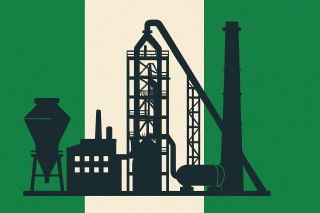This week we take a look at Titan Group's 2022 Sustainability Report. The vertically-integrated Greek building materials company has a global presence, stretching from Brazil and the USA to Europe, the Mediterranean and Egypt. During 2022 the company invested approximately EGP67m (US$2.16m) in improving environmental management systems. It has prioritised dust control systems, increased waste recycling of by-pass gas and has shifted to low-carbon products. It also has mid- to long-term goals and is fully committed to carrying out its 2030 Decarbonisation Roadmap.
Central to the group's carbon reduction programme is its approach to reduce energy and natural raw material consumption in cement manufacturing. As a result Titan Egypt's Beni Suef cement plant launched in 2022 a low-carbon masonry cement product called '12.5X', successfully replacing CEMII/B-L 32.5R. This was built upon by the markets of Serbia, Albania and Kosovo receiving Titan's low-carbon cements from February 2023. Green products now account for 6.4 per cent of the group's cement production compared to 5.4 per cent in 2021 and 2.7 per cent in 2020.
Titan Egypt's thermal energy totalled 9251TJ in 2022. This was an increase on the 9030TJ consumed in 2021, because of the higher specific heat consumption attributed to burning a different fuel mix with a higher percentage of RDF, claims Titan. At the same time, electrical energy consumption fell following a decrease in the clinker-to cement ratio from 84 to 82.8 per cent while renewable energy consumption crept up to 11.4 per cent in 2022 from 10 per cent in 2021.
The move towards AF
Alternative fuels (AF) are one of the big levers to aid Titan Group to decarbonise. The co-processing rate dipped a little to reach 13.1 per cent in 2022 from 13.9 per cent in 2021, but this was still up from 11.5 per cent in 2020 during the COVID-19 pandemic. The group uses RDF, biomass, tyre-derived fuel and used oil totalling around 74,000tpa. Conventional fossil fuels still make up 86.9 per cent of the group's fuel mix, coal accounts for 59.5 per cent and petcoke usage amounts to 25.6 per cent. Biomass has increased its share from 0.9 per cent in 2021 to 2.5 per cent in 2022. Waste tyres have remained at 3.5 per cent of the fuel mix while RDF usage has risen from 6.6 per cent in 2021 to 9.4 per cent in 2022. Forward-looking improvements will include reducing of non-renewable resources by using municipal and agricultural waste as alternative fuels.
Titan has evolved a strategy to integrate its AF backwards to build concessions and create alliances with AF producers. This has become more important with shortages of fossil fuels, foreign currency shortages and higher costs of fuels, along with CO2 mitigation targets and a lack of shredding facilities to process municipal solid waste. Titan Egypt has established the Green Alternative Energy Assets (GAEA) to provide the Beni Suef and Alexandria kilns with AF and is now expanding these services to a wider market. Therefore, the Beni Suef plant is currently installing a mechanical feeding system for AF.
CO2 emissions targeted
AF applications have helped reduce Scope 1 CO2 emissions and in 2022 679kg/t of cementitious product were produced compared to 6b83kg/t of cementitious products in 2021 and 709kg/t of cementitious products in 2020. Further improvements are expected with the introduction of a new product (CEM II A-P 42.5) and with the 2030 initiative in Egypt. Scope 2 CO2 emissions fell from 0.16Mt in 2021 to 0.14Mt in 2022, reflecting energy efficiency improvements. However, Scope 3 CO2 emissions rose from 227,600t in 2021 to 270,000t in 2022. The group's CO2 emission targets were validated by the Science Based Targets Initiative (SBTi) in July 2021 to build a detailed Scope 1 2030 decarbonisation roadmap.
Progress on reducing NOx emissions has been made from 1303.9g/t of clinker in 2021 to 1274.3g/t of clinker in 2022. However, SOx emissions increased from 68.1g/t of clinker in 2021 to 113.7g/t of clinker in 2022.
Summary
While not all targets in Titan Group’s Sustainability Report have exceeded industry norms, the movement to a validated CO2 emission target approach with the SBTi and the formation of a 2030 Roadmap has underlined the group’s commitment to improving its environmental performance. In Egypt it has been difficult to build the infrastructure to expand the AF usage, resulting in the creation of GAEA. Breaking away from fossil fuels has not been a smooth ride and Titan Group's use of renewable energy is an area where it can still make significant progress.
